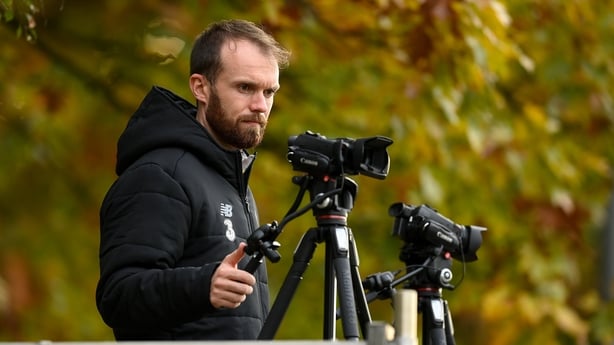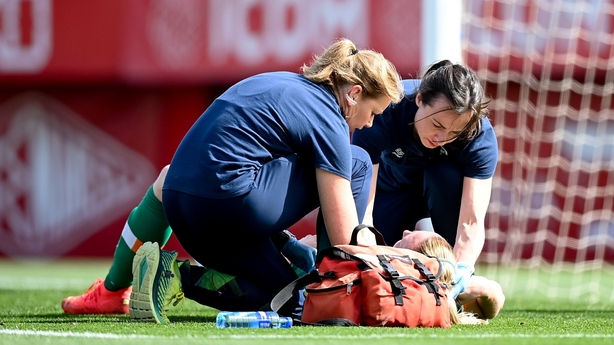As the Republic of Ireland rumble towards a first ever appearance at a Women's World Cup, the team behind the scenes have been busy greasing the wheels.
Vera Pauw leans heavily on the bank of knowledge her entourage provides - a statistician, analyst, doctor and physio who all are dedicated to finding the extra few percent that can enhance team performance.
Pauw was thrilled to get through June’s training camp without any fresh injuries as players returned in dribs and drabs, having taken a few weeks’ holiday after their club campaigns ended.
"Periodisation" was the buzz word. Everyone was monitored closely on the training pitch, with data collected and pored over to help the manager make important calls.
It's a circle of trust that starts with Niamh McDaid, a former Donegal Gaelic footballer with an undergrad in health and performance science. An employee with Northern Ireland-based sports tech company StatSports, McDaid is an expert with the tools of her trade.
"StatSports and the FAI are partners so part of my role within StatSports is every time we’re in camp… I’m the GPS provider for them," she says.
"The girls all wear GPS pods during every session and heart rate monitors so we’re tracking both GPS and heart rate live during every session. We’re tracking through every drill, so every drill is cut in real time and we’ll make decisions there and then.
"We’ll look at things like GPS reports, heart rate recovery and the players will get an insight into that as well, which is really important for them.
"[During matches] I’d have two iPads on the go at all times – a StatSports iPad and then we use an app called Polar to track all the heart rates live. I try to go between the two.
"It’s great to make those decisions on the grass, that’s when you want to make the right call."

Aiding those in-game calls is Pauw’s eye in the sky, Andy Holt.
He worked initially in the FAI’s High Performance department, linking up with Ireland women’s team in 2019. Holt works closely with the FAI's Head of Performance Analysis, and the Ireland men's team head analyst, Ger Dunne, who will support him in Australia.
Holt is a key part of the four-person technical team; assistant manager Tom Elmes, goalkeeper coach Jan Willem van Ede and, of course, Pauw are the others.
"Before we actually get into camp for a game, myself and Tom would look after the opposition analysis," the Wicklow man says.
"We'd look back at about 10 of the previous games, especially if there was a key player missing within their previous two or three games, we definitely go back further. Look at those, analyse them, we would get the TV and tactical footage.
"Basically put that together and then put together clips on the four functions: attacking, defending and your two translations. Looking at key trends within those functions on the teams."
Holt’s head is constantly buried in a laptop as he picks out strengths and weaknesses, both in the opposition and in Ireland. He’s stationed from a vantage point during games, racing down to the dressing room at half-time to deliver his analysis to Pauw.
"Myself and Jan Willem, we’d be up in the stands. I would have a live feed into my MacBook, and I'd be clipping the game away.
"We’d have three or four clips - what we're doing well, how we can improve or what we can improve on, and then we'd show them at half-time. It's a big part of the game, especially if the players can see exactly what they can [do] or areas that we could exploit the opposition."
Formulating a gameplan, Holt says, is a collaborative effort: "It's down to myself and part of the technical staff, which is Vera, Tom and Jan - and Niamh as well. We'd all sit down together and come up with a gameplan off the opposition analysis that myself and Tom have done."

While McDaid and Holt focus on the technical side of things, Dr Siobhan Forman and Angela Kenneally are tasked with keeping the bodies healthy.
Dr Forman works at Cappagh National Orthopaedic Hospital. She came into the senior fold after regular doctor Maeve Doheny took time away to give birth to twins, but it was not completely new territory: Forman was the team doctor at the 2014 Under-19s Euros where the likes of Katie McCabe, Megan Connolly and Chloe Mustaki were involved.
She was also a top-class rower, winning several national titles including a doubles success with Olympian Sanita Puspure.
"My last national championship was a doubles win with Sanita, she was my doubles partner and a phenomenal girl so the rowing was very close-knit so I understand how deep it is to be with a team that was all together and trying to get places," she says.
"I’m blessed. I work up in Cappagh National Orthopaedic Hospital, a lot of my colleagues there would already be involved in a lot of sports. They are all dealing with sports and athletes all the time so they had a good understanding of the intensity and the time that would be required.
"I can still remember the day we were given the pre-planning for the tournament, it was about a month or so after Hampden that we got the itinerary for the camps in June and July and then the World Cup itself, and going to my clinical director and saying this is what it is and how does it look with my role in Cappagh.
"She basically said ‘show me where to sign’. I am in a really blessed position."
Physio Angela Kenneally is the longest-serving staff member in the women's setup. She runs her own practice in Kildare, and acts as the link with the players' clubs, staying on top of any injuries or niggles that need to be managed.
She's a pelvic health specialist and wrote a thesis about the effect of the menstrual cycle on performance in elite athletes as part of her Physiotherapy masters.
The commitment is massive; balancing work and family can be "chaos".
"I work full-time 40 hours a week five days a week," says Kenneally. "I have two small children, a five-year old and a one-year old, and then the team. I think you just keep going. You don't have time to think about it. It is just go, go, go.
"I find the nerves come in the time just before a game because you are thinking. 'do you have everything and is everyone going to be OK?'. Then it kicks off and it's fine."
Come Thursday night [Sydney time] all the prep and homework will have been done as Ireland's great World Cup adventure finally begins.
Watch every game from the 2023 FIFA Women's World Cup live on RTÉ, with comprehensive coverage of the Republic of Ireland across television, radio and digital








